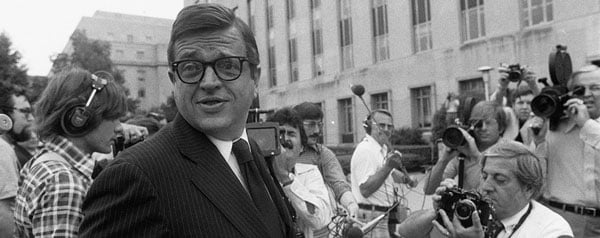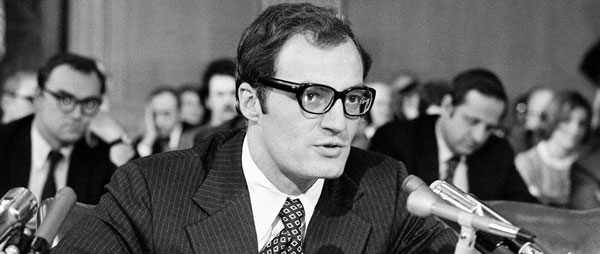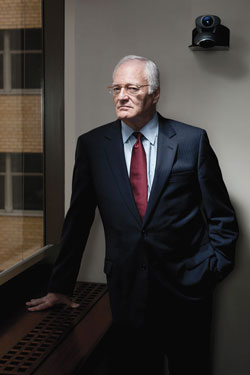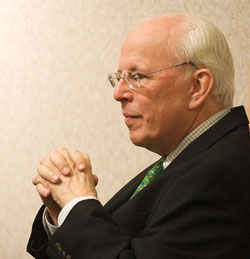The Lawyers of Watergate: How a '3rd-Rate Burglary' Provoked New Standards for Lawyer Ethics

Photo of John W. Dean III swearing in by ©Bettmann/Corbis/AP Images.
On June 26, 1973, the growing Watergate scandal was already a year old, and John W. Dean III, President Richard M. Nixon’s former White House counsel, was in his second day of testimony before the Senate Watergate Committee when Herman Talmadge, a Democrat from Georgia, directed his attention to exhibit 34-47.
“It is a list of all the people that you thought had violated the law and what the laws may be that they violated—is that correct?” the Georgia senator inquired.
“That is correct,” Dean responded. “My first reaction was: There certainly are an awful lot of lawyers involved here. So I put a little asterisk beside each lawyer.”
“Any significance to the stars?” asked Talmadge, referring to the asterisks.
“That was just a reaction of mine,” answered Dean. “How in God’s name could so many lawyers get involved in something like this?”
Forty years ago this month, five “burglars” wearing business suits and surgical gloves and toting electronic surveillance equipment were arrested inside the headquarters of the Democratic National Committee at the fashionable Watergate office complex in Washington, D.C.
The Nixon White House initially dismissed the break-in as a “third-rate burglary,” but after a year of increasingly persistent media coverage, Congress initiated multiple investigations that exposed the involvement of more than 20 of the most powerful lawyers in the United States.
At the top of the list was Nixon, the 37th president of the United States, who resigned on Aug. 8, 1974, as Congress was gearing up to conduct impeachment proceedings.
But the list also included two U.S. attorneys general, two White House counsel, an assistant attorney general and a chairman of the U.S. Securities and Exchange Commission.
Nixon was pardoned by his successor, Gerald R. Ford, for any possible crimes, but many of the president’s men were found guilty of a litany of criminal offenses, including campaign finance fraud, obstruction of justice, lying to federal agents and Congress, and conspiring to violate the constitutional rights of citizens.
Watergate clearly—and perhaps permanently—undermined public trust and confidence in government and its leaders. But the scandal also spurred a significant decline in public opinion of lawyers from which the profession has never fully recovered.
In a 1998 law review article tracing attitudes toward lawyers, Marc Galanter, now a professor emeritus at the University of Wisconsin-Madison, said that public regard for lawyers was at an all-time high in the 1960s, when lawyers were viewed as fighting for justice and civil rights in real life and in the movies.
The large number of “discredited lawyers who figured so prominently among the Watergate villains” accelerated the decline in the public’s opinion of the profession, Galanter wrote.

Photo of Charles W. Colson by ©Bettmann/Corbis/AP Images
THE EARLIEST BREAK-IN
Watergate actually was the culmination of a chain of events that began months before the failed break-in at the Democratic Party offices.
In March 1971, presidential assistant Charles Colson helped create a $250,000 fund for “intelligence gathering” of Democratic Party leaders. A few months later, Colson developed the infamous “enemies list,” which targeted political opponents with government actions such as IRS tax audits.
By the summer of 1971, John Ehrlichman had authorized the creation of a special investigations unit, known simply as the Plumbers. Their primary function was to plug news leaks, but they quickly went beyond that. Their first target was the office of Los Angeles psychiatrist Dr. Lewis J. Fielding, whose former patient Daniel Ellsberg had leaked the Pentagon Papers, a secret Defense Department account of U.S. involvement in Vietnam, to the New York Times. Heading up the Plumbers was Egil “Bud” Krogh Jr., a deputy assistant to the president. Among his recruits were G. Gordon Liddy and E. Howard Hunt, who organized the Watergate break-in while working for the Committee for the Re-election of the President, aka CREEP.
Krogh met John Dean during the Nixon administration’s transition into office in January 1969, and the two became casual friends.
Dean, who had gone to prep school with Barry Goldwater’s son, was practicing law in Washington in 1968 and volunteered to write position papers for the Nixon campaign. As a reward, Dean, who was only 30 and less than four years out of law school, was named associate deputy to U.S. Attorney General John Mitchell in 1969. When Ehrlichman was named chief domestic adviser a year later, Dean replaced him as White House counsel.
“Looking back, I am amazed at how I came to be in those extraordinary positions of authority and influence,” Dean says. “I certainly didn’t have the qualifications or experiences that one would think you would need. But I was eager and worked hard and I believed in what we were doing.”
Krogh was just 29, had passed the bar examination in Washington state only two months earlier and was practicing zoning law in Seattle for Ehrlichman’s firm when Ehrlichman convinced him to join the Nixon team.
Both men knew Liddy, a lawyer-turned-FBI agent-turned-secret operative for CREEP.
But Dean and Krogh were much more than just lawyers working for the White House. The FBI called Dean the “master manipulator of the Watergate cover-up.” When it came to names and dates, meetings and roles, Dean was the man in the middle. He knew it all.
Ehrlichman put Krogh in charge of the Plumbers in 1971. “I operated and proceeded under the premise that I was justified because national security was at stake, and that I was not to mention it,” Krogh says.
“I was told this directly by the president,” he says. “I had written authorization from the president, but it didn’t matter. Did I make the call and authorize? The answer: I did. That’s all that matters.”
But in the winter of 1971, Krogh refused to approve additional wiretaps sought by Liddy and the Plumbers. Eventually Krogh was re assigned to the post of undersecretary of Transportation.
Krogh and Dean admit they were too young, too naive, too willing to do anything for their president.
“In law school, I took this curious course on ethics,” says Krogh. “But there was nothing about conflicts or the role of lawyers. We were in completely unknown territory. I was completely unprepared. My loyalty to Richard Nixon was personal and total. And I had extraordinary loyalty to John Ehrlichman.”
Dean understands that thinking. “When I was White House counsel, I thought Richard Nixon was my client,” he says.
“He seemed to think that was the case as well, for he had me undertake activity as his legal intermediary for such personal matters as estate planning and management of his real estate and personal property.
“Today it is clear that the client of the White House counsel is not the president of the United States, but rather the Office of the President of the United States,” says Dean. “Post-Watergate, this has been made clear.”

Photo of Egil “Bud” Krogh Jr. by Associated Press
EPIPHANY AND CONFESSION
Unbeknownst to each other, Dean and Krogh had epiphanies that changed their lives and the course of American history.
For Dean, the realization came two days after the Watergate break-in, when Ehrlichman told him to meet with Liddy.
“Gordon not only confessed the Watergate break-in was his operation at the request of the president’s re-election committee, but that he, Howard Hunt and two of the men arrested at the Watergate had also been involved in an earlier break-in at the offices of a psychiatrist treating Dan Ellsberg,” Dean says. “Liddy thought he was James Bond, but he wasn’t quite Maxwell Smart,” he adds.
Dean tried to persuade Ehrlichman and Attorney General Richard Kleindienst that they needed to hire a criminal defense attorney to help them navigate their decision-making.
“Ehrlichman dismissed the suggestion immediately, as unnecessary and an overreach,” says Dean. “He made some comment like, ‘Wouldn’t the press love to learn that fact.’ ”
Over the next few months, Dean says, he became more and more concerned and finally had a staffer bring him a copy of Title 18 of the federal criminal statutes. Seated at his desk a few days after Nixon had won re-election in a landslide over George McGovern, Dean started reading section after section about obstruction of justice and perjury and campaign finance fraud.
“The section that caught my attention was 18/1503, which is the obstruction of justice provision, which clearly applies to the payment of hush money,” says Dean, referring to payments the Watergate burglars had received from funds earmarked for CREEP. “When I raised the statute with Ehrlichman, he said it wasn’t hush money but rather humanitarian money to help these people who had tried to help us.”
“Good God,” Dean recalled thinking, “we’re all going to prison.”
Dean and Krogh were together the day before Dean had his now infamous March 1973 meeting with Nixon at which he declared that there was “a cancer on the presidency.”
“John told me that he was under enormous pressure and that he didn’t think the president knew what was going on,” Krogh says.
“At age 32, I didn’t feel very good about going to the leader of the free world to tell him what’s happening is illegal,” Dean says. “I didn’t know when I took a job in the Nixon White House that it would have helped if I had experience in criminal law. Come to find out, it was essential if you worked in the Nixon White House.”
Nixon told Dean to go to Camp David for a few days in late March 1973 to draft a report on everything he knew about the cover-up. But Dean quickly realized that such a report would make him an easy scapegoat.
Instead, Dean hired a lawyer and began cooperating with prosecutors. Nixon fired Dean on April 30.
Two months later, the nation watched as Dean testified live before the Senate Watergate Committee, becoming the first witness under oath to directly connect the president to the illegal activity.
In October, Dean pleaded guilty to obstruction of justice. U.S. District Judge John Sirica sentenced him to serve one to four years in prison. Dean spent much of the four months he served testifying in the trials of Ehrlichman; Mitchell; Nixon’s chief of staff, H.R. Haldeman; and others charged with crimes related to Watergate.
Special prosecutor James Neal, who was lead counsel in the trial against Mitchell, Ehrlichman and Haldeman, called Dean “the best witness I’ve ever examined.” Neal said Dean’s recollection of dates and meetings and statements of those in the meetings was superb and key to winning the convictions.
Krogh’s revelation came over Thanksgiving weekend in 1973 while he and his family visited historic Williamsburg, Va. He had just been indicted for conspiring to violate the federal civil rights of Dr. Fielding, but was refusing to cooperate with special prosecutors because Nixon had told him that what he knew was a matter of national security.
“Here I was, under indictment, and yet I was free to travel, free to associate with whomever I wanted, I could say anything I wanted,” Krogh says. “But I was charged with stripping another citizen of his constitutional rights. “I felt like a hypocrite,” he says.
Four days later, Krogh met with newly appointed special prosecutor Leon Jaworski, who had been ABA president in 1971-72.
“I made mistakes, and I’m so sorry,” Krogh says. “I’m a firm believer that when you do something wrong, you take the hit, you take the punishment.”
“It comes down to the fact that I did not exercise my integrity,” he says. “That was my failure.”
Krogh offered his immediate cooperation and agreed to a guilty plea.
“A presidential pardon would have killed me,” he says. “I didn’t want to be offered clemency by President Nixon because I would have had to turn him down.”

Photo of Egil “Bud” Krogh by Eli Meir Kaplan Photography
IMPACT ON ETHICS
Within weeks, Krogh was sentenced to two to six years in federal prison, though he served less than five months.
“I quickly discovered that I was one of the few guilty people in prison,” he says wryly.
An overarching question about Watergate is why at least one of the lawyers working for the president didn’t try to stop it. But it never seemed to occur to them, or they felt their loyalties were more important than their ethics obligations.
“In 1972, legal ethics boiled down to ‘don’t lie, don’t cheat, don’t steal and don’t advertise,’ ” says Dean. “When I took the elective course in ethics at law school, it was one-quarter of a credit. Legal ethics and professionalism played almost no role in any lawyer’s mind, including mine. Watergate changed that—for me and every other lawyer.”
After Watergate, schools began to make legal ethics a required class. Bar examinations added an extra section on ethics. And nearly all states started requiring lawyers to attend annual continuing legal education programs focused on ethics and professional conduct.
“The overwhelming opinion was that if the lawyers working for President Nixon had acted differently, the nation would have been spared the trauma of the Watergate scandal,” says Arnold Rochvarg, professor at the University of Baltimore School of Law, who served on the defense team for Robert Mardian, a former U.S. assistant attorney general convicted of Watergate crimes.
Changes in ethics rules for lawyers were more gradual, but just as profound.
In 1977, the ABA created the Commission on Evaluation of Professional Standards, whose work led to the adoption of the Model Rules of Professional Conduct by the association’s policymaking House of Delegates in August 1983. The Model Rules replaced the Model Code of Professional Responsibility, which had been in effect since 1969.
The issue of confidentiality received a lot of attention from the Kutak commission, chaired by Robert Kutak of Omaha, Neb., until his death in January 1983. During their criminal trials, several of Nixon’s lawyers argued that they were ethically bound to honor the secrets of their clients, even if they involved illegal actions. The argument became widely and pejoratively known as the “Watergate defense.”
The Kutak commission recommended that lawyers representing an organization be allowed to disclose confidential information concerning officers or employees who are violating the law.
But the House of Delegates rejected the disclosure proposal and instead opted to allow lawyers faced with such circumstances to resign their representation if the client organization refused to address illegal acts. A handful of states, including Maryland, Michigan and New Jersey, still adopted the disclosure rule; eventually more than 40 states adopted the rule in some form.
The ABA rule held up for the next two decades, despite proposals to revise it in 1991 and 2002. But then financial scandals at two of the nation’s largest corporations, Enron and MCI WorldCom, again raised questions about the ethical duty of lawyers to disclose ongoing fraudulent activity.
As Congress debated the Sarbanes-Oxley Act, several U.S. senators argued that the SEC should do what the ABA had failed to do: require lawyers to report evidence of a material violation of securities law or breach of fiduciary duty to officials higher “up the ladder.”
Rochvarg says the goal of the key provision, called section 307, was to prevent lawyers from sitting idly by with knowledge that their clients were committing fraud.
Congress passed Sarbanes-Oxley in 2002. A year later the House of Delegates, acting on the recommendation of the Task Force on Corporate Responsibility, amended Model Rule 1.6 to allow, but not require, lawyers to reveal confidential information if the client is using their legal advice to commit fraud. The House also amended Rule 1.13 to permit lawyers to disclose confidential information outside the organization about clear violations of law if the highest officials in the organization fail to address the problem—but only to the extent necessary to prevent substantial injury to the organization.

Photo of John Dean today by Byron Miller Photography
TEACHING BY EXAMPLE
Today, Krogh and Dean travel around the country speaking to bar associations, law firms and law schools about legal ethics. Each has been booked for about 20 programs in 2012.
“Today’s rules would have had a dramatic impact on my decision-making back in 1972,” says Dean, who started presenting ethics programs when the Chicago office of global law firm Skadden, Arps, Slate, Meagher & Flom asked him to speak to its lawyers. “We walk the audience through that first week of Watergate. We apply today’s rules to that situation. There are whole new sensitivities toward legal ethics.
The Skadden CLE was such a success that the law firm’s other offices booked Dean, too. Now the offers are rolling in. He says he’s invited other Watergate lawyers to join him at the programs, and some have agreed.
Krogh does his own CLE ethics presentations, which have been equally successful. Like Dean, he tells his dramatic story with an insider’s view of the Nixon White House, a lawyer’s view of what happened—and why.
“Too many ethics programs focus too much on the technicalities or exact wording of the commentary in the Model Rules of Professional Conduct,” says Krogh. “But those CLE programs totally miss what it means to be a lawyer. They don’t teach integrity. We are responsible for maintaining the integrity of the legal profession. The ethical responsibilities go with the lawyer no matter who the client is or what the situation.”
Krogh and Dean say that legal ethics training needs to better examine the external threats to a lawyer’s integrity, such as pressure for results, a conformist mindset and the demand for secrecy—all of which were part of the pressures facing the lawyers in the Nixon White House.
“The sad thing is, I never asked the most basic question in 1971 and 1972: ‘Is this right? Am I doing the right thing?’ ” Krogh says.
Krogh and Dean talk frequently these days. Both wish they had known each other better 40 years ago.
“If Bud and I had been able to sit down with each other back then at the White House, and we had been able to share our concerns, everything might have turned out differently,” Dean says.
Krogh and Dean were disbarred for their roles in Watergate—Krogh in Washington state and Dean in Virginia.
Krogh tried to get his license back as soon as the time limit set on his disbarment had expired. Even the man who prosecuted him, Jaworski, wrote a letter to the bar and state supreme court endorsing Krogh’s readmission.
“Every decision I made back then looked forward to what would make it easier for me to come back to practice law,” says Krogh.
In May 1980, Krogh received the call. The Washington Supreme Court would allow him to practice again, but he had to retake the bar examination, including its new ethics and professionalism section, on very short notice. He drove that day from San Francisco to Seattle, through the volcanic dust of Mount St. Helens, which had erupted two days earlier, so that he could take a bar preparation course.
“I spent nearly all my time studying the ethics portion,” Krogh says. “I feared this huge headline in the newspaper: ‘KROGH FAILS ETHICS … AGAIN!’ ”
Krogh passed, and he has practiced energy law and mediation for 15 years at Seattle’s Krogh & Leonard, where he is a partner.
Dean, by contrast, had no interest in practicing law again. He’s spent the past four decades writing books and working as an investment banker in Beverly Hills.
“I feared that seeking to regain my law license would become a political circus,” Dean says. “I didn’t need a law license to run my business, though I always use my knowledge of the law.”
But Dean says he is strongly reconsidering his decision and may seek to get his law license back this summer.
“All of the Watergate lawyers who wanted their license back have gotten it,” he says. “I’ve had more than one person from the Virginia bar tell me they don’t think it would be a problem.
“I don’t know that I want to practice law again,” says Dean. “It’s more about redemption.”

600px.jpg)


